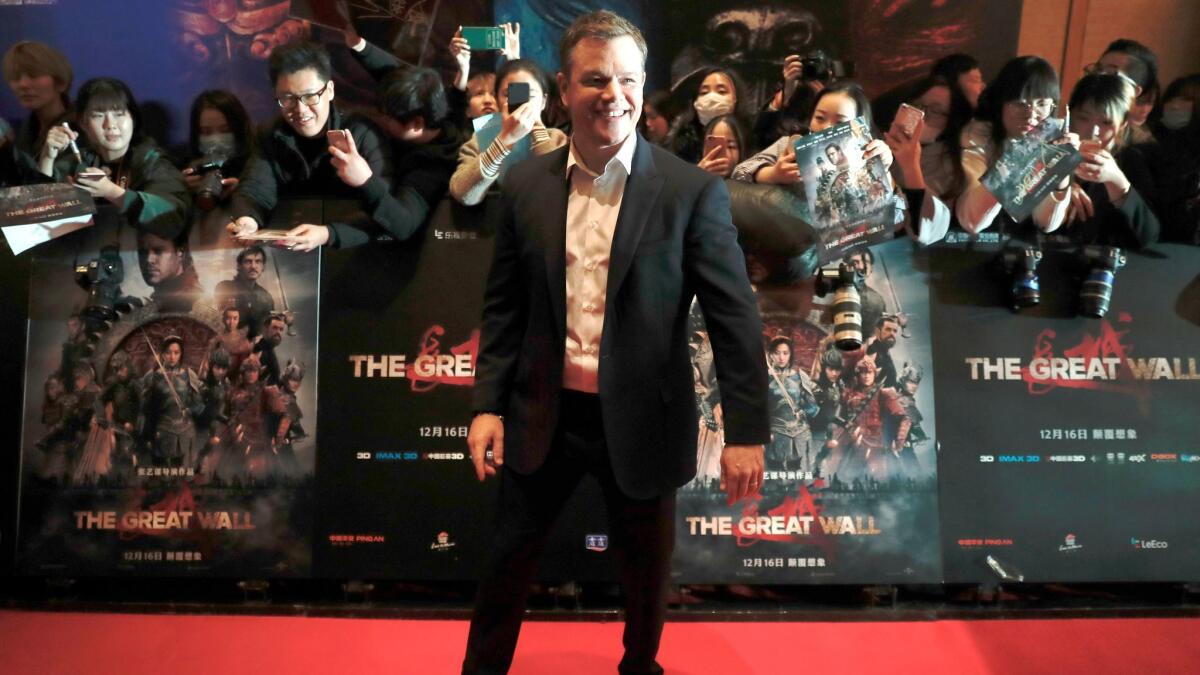Op-Ed: Don’t worry, Hollywood. China’s not a threat

- Share via
Is China about to take over Hollywood? Chinese investment has flooded into the industry in recent years. AMC, the world’s largest network of theaters, is owned by the Dalian Wanda Group, which also has purchased Legendary Picture Productions. Three other entertainment giants — Dick Clark Productions, Voltage Pictures and MGM — also would have been snapped up by Chinese companies this year if those deals hadn’t fallen prey to Beijing’s crackdown on capital flight.
The pace of dealmaking has been so furious that Congress may get involved. Late last year, 16 members of Congress signed a letter warning of the ramifications of a Chinese assault on Hollywood. “Beijing could dictate what is and isn’t made,” then-Rep. Frank Wolf (R-Va.) warned in an op-ed in the Washington Post.
As someone who has moved between China and America since 1980, I share those concerns. It’s been 20 years since Hollywood made a movie in which Chinese authorities or China itself were painted in a somewhat negative light. Most recently, China saved an American in “The Martian,” saved the planet in “Arrival” and in “Transformers: Age of Extinction,” Paramount portrayed Chinese officials as more competent than their American counterparts. Hollywood’s craven currying of Chinese favor in exchange for a piece of its vast market rivals only that of Mark Zuckerberg’s ploys to get Facebook unblocked in China.
That said, before we unspool into a tizzy of anti-Chinese paranoia, it’s important to remember two things: China’s film industry remains abysmal artistically, and it has begun to flail financially. Indeed, while some American observers worry about China’s takeover of the U.S. entertainment industry, their Chinese counterparts, with some justification, fret that it could end up the other way around.
First, the numbers. In 2016, China’s much-vaunted filmmaking industry churned out 1,000 movies, clearly a case of quantity over quality. On average, these movies made about $2 million apiece in China compared with the $70 million the average Western movie made there. In fact, Hollywood accounted for 42% of China’s box office take last year even though, under World Trade Organization rules, Western films were capped at 34 releases in China. That number is set to go up in 2017, so things could get even worse for China’s homemade films.
What’s more, almost every Chinese film company is facing financial difficulties. Huayi Brothers, a Chinese knockoff of Warner Bros., which once claimed that its market valuation would exceed $17 billion, is now worth barely north of $3 billion, down from $15 billion. The stock price of Enlight, another studio, has fallen 60% since the go-go days of 2015.
China’s box office revenues are stagnant too. After climbing 50% in 2015, it slowed to a crawl in 2016 and this year, it’s actually down. The only bright spots have been two films — “Furious 8” and the Hong Kong comedy “The Mermaid,” which weren’t made in mainland China.
There’s lots of debate about the reasons for this downturn, but a central one is the simple fact of Chinese censorship: Chinese films will continue to stink as long as the government keeps its hands in the business of making movies.
Take a look at the most ambitious Western-Chinese project ever made: “The Great Wall” starring Matt Damon. The storyline was profoundly conservative, casting Damon and others as defenders of the Chinese state against a gang of monsters. The only redeeming feature this lemon had was special effects.
And not only was the movie a product of state censors but so were the reviews. When audiences gave the movie lukewarm ratings — 4.9 out of 10 — on Chinese online movie sites similar to Rotten Tomatoes, the People’s Daily reprimanded those sites in an editorial, resulting in at least one of them removing the reviews. “The Great Wall” is reportedly set to lose Universal, the China Film Group and other partners $75 million.
In an online essay, one Chinese ad executive listed the reasons blockbusters couldn’t be made in China. Something like “The Hunger Games” would never work, he noted, because “it was about a bunch of poor people opposing a dictatorship.” Scratch “Ironman” too because the People’s Liberation Army would demand a say in the depiction of new military technology. “Gravity” would be a nonstarter because it concerns a crash in space and China’s space agency wouldn’t allow anything like that. “Fast and Furious” would need input from China’s traffic cops. And as for “The Lord of the Rings,” no way. In 2009, the China State Administration of Press, Publication, Radio, Film and Television — China’s movie czar — announced that fantasy films were “rampant” and ordered producers to base future scripts on domestic fairy tales only.
Is there an issue with Hollywood bending over backward to please the Red Mandarins in Beijing? Definitely. But it’s important not to exaggerate the threat. Before China can stage-manage Hollywood into telling China’s story, it’s got to have a decent story to tell in the first place.
John Pomfret is an editor at large at SupChina and the author of “The Beautiful Country and the Middle Kingdom: America and China From 1776 to the Present.”
Follow the Opinion section on Twitter @latimesopinion or Facebook
More to Read
A cure for the common opinion
Get thought-provoking perspectives with our weekly newsletter.
You may occasionally receive promotional content from the Los Angeles Times.










